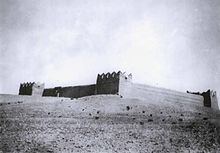Our website is made possible by displaying online advertisements to our visitors.
Please consider supporting us by disabling your ad blocker.
Battle of Jahra
| Battle of Jahra | |||||||
|---|---|---|---|---|---|---|---|
 Kuwait Red Fort | |||||||
| |||||||
| Belligerents | |||||||
| Commanders and leaders | |||||||
|
|
(Commander of Defense Security Force Cavalry and Infantry of Al-Kout Fortress) (General cavalry commander) | ||||||
| Strength | |||||||
| 3,000-4,000 men | 1,500–4,000 men | ||||||
| Casualties and losses | |||||||
| 400-500 killed | 300 killed | ||||||
The Battle of Jahra occurred on 10 October 1920 during the Kuwait–Najd War, pitting Sheikh Salem Al-Mubarak Al-Sabah, the ruler of Kuwait,[2][3] against the Ikhwan forces led by Faisal al-Duwaish, the sheikh of the Mutayr tribe. The confrontation took place in the village of Al-Jahra, located west of Kuwait City.[4] The battle resulted in a costly victory for the Ikhwan, who succeeded in capturing Jahra village. Sheikh Salem, along with some of his forces, took refuge in the Red Palace, where they fortified themselves.[5][6]
The Ikhwan then besieged the fort and offered terms of reconciliation to Sheikh Salem, which he refused. This prompted the Ikhwan to launch an attack on the palace, but they failed to breach its defenses. Despite the successes of the Kuwaiti forces in repelling the attackers, the defenders faced severe difficulties due to a lack of water, making it hard to endure the siege. As the second day of fighting began, their patience was nearly exhausted. However, the arrival of reinforcements by sea to Kuwait City provided much-needed relief.
Faisal Al-Duwaish, in an attempt to gauge the condition of the besieged, sent a Ikhwan jurist to negotiate terms of reconciliation. Sheikh Salem pretended to accept these terms but had no intention of honoring them, focusing instead on ending the siege. He instructed his secretary to draft a letter to Faisal Al-Duwaish, feigning submission to the reconciliation terms, on the condition that the Ikhwan withdraw from the palace and Jahra. As a result, the Ikhwan withdrew to Subaihiya in southern Kuwait on 12 October 1920.[7]
The Ikhwan, after their initial siege and failed assault on the Red Palace during the Battle of Jahra, attempted to negotiate with Sheikh Salem Al-Mubarak Al-Sabah to finalize the reconciliation process. However, Sheikh Salem declined their terms and instead sought British military assistance. In response, the British deployed military forces to Kuwait and issued a stern warning to the Ikhwan via aerial leaflet drops over their camp in Subaihiya, advising them to halt any further attacks on Kuwait.
Simultaneously, Ibn Saud, the ruler of Najd, intervened by dispatching a delegation to Faisal al-Duwaiish, the leader of the Ikhwan, urging him to abandon his plans for another assault on Kuwait. Under this combined pressure from both the British and Ibn Saud, the Ikhwan withdrew from their camp in Subaihiya and returned to Najd.
Ultimately, the ruler of Muhammara, Sheikh Khazʽal Ibn Jabir, played a key role in mediating the conflict. He facilitated a reconciliation between Sultan Abdul Aziz Al Saud of Najd and Sheikh Salim Al-Mubarak Al-Sabah of Kuwait, bringing an end to the tensions between the two sides.[8]
- ^ Reeva S. Simon; Philip Mattar; Richard W. Bulliet (1996). Encyclopedia of the Modern Middle East - Volume 1. p. 119.
Fighting between Kuwait's forces and Wahhabi supporters of Ibn Sa'ud broke out in May 1920, and the former were soundly defeated. Within a few weeks, the citizens of Kuwait constructed a new wall to protect Kuwait City.
- ^ The Modern History of Najd, Amin al-Rihani, page 273.
- ^ History of Kuwait, Abdul Aziz Al-Rasheed, page 255
- ^ Kuwait and its neighbors, Harold Dixon, p. 264.
- ^ Abdul Aziz Al-Rasheed, History of Kuwait page 259.
- ^ The blood red place of Jahra, Kuwait Times (newspaper)."Archived copy". Archived from the original on 2012-06-05. Accessed on 2010-09-23.
- ^ Political History of Kuwait, Part IV, Hussein Khalaf Sheikh Khazal, page 272
- ^ History of Kuwait, Abdul Aziz Al-Rasheed, page 249.
Previous Page Next Page



